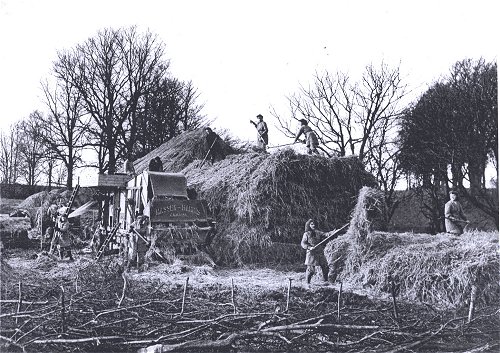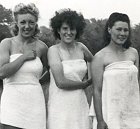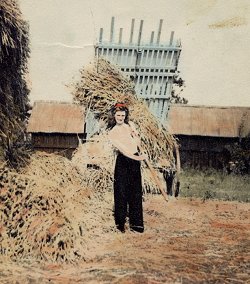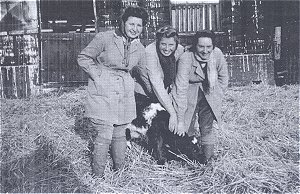Bedfordshire Land Girl Memoir
Bedfordshire Women's Land Army
Stella Goldsmith nee Limon
Page 5
Threshing gang
It wasnt long after this that we were introduced to the threshing machine. It arrived in Toddington one Monday morning and for the whole of the next year we had to follow it from farm to farm.

At first we were set to raking out the chaff and cavings. The cavings could be raked out on the side of the machine away from the stack, but the chaff was another matter: you were stuck in between the stack and the machine covered in dust and chaff, usually with the smoke from the steaming engine adding to your misery. Not only that as they disturbed the rats and mice on the rick, they would land with a thud all around you. If you showed the slightest amount of fear and apprehension the farm labourers would take the greatest delight in throwing the occasional one on to your head.
 At the end of the day raking chaff you certainly tried to be one of the lucky
ones to get a bath back in the hostel.
At the end of the day raking chaff you certainly tried to be one of the lucky
ones to get a bath back in the hostel.
While we still had to take our turn with the chaff and cavings we eventually were allowed to do other jobs. One I dont know how I managed it was to strip the straw thatching off a new stack, some of them being as high as a house with steep sides so that the rain would run off. Then we started to pitch the sheaves down to the machine. As the top of the rick was about four sheaves in diameter, how we didnt fall off and break our necks I dont know.
As we got further down there would be two of us, one to toss the sheaves to the side by the machine and the other to toss them on to the platform. The girl on the platform would pick it up and with one movement cut the binding string and pass it on to the person feeding the machine. This job was quite pleasant, if a bit hard on the back. The cleanest job was being a feeder which was not without its risks as the slightest error of judgement and you could end up minus an arm or worse. And didnt the men enjoy recounting the accidents that had occurred over the years!
 At one end of the machine the straw came out and that had to be pitched to
the person building the straw stack. After wed been on the job for some months
and had watched countless straw stacks being erected, Vera Goldsmith and I were allowed to have a go ourselves. We were getting on fine and
had got to about 10 12 feet when suddenly one side slipped and we were
catapulted to the ground - pitchforks landing by the side of us. Only our pride
was hurt as everybody just stood and laughed. Shortly after that the owners of
the machine obtained a straw bailer and then our job was to stack the finished
bales and repair the string when it wasnt working as it should (more often than
not).
At one end of the machine the straw came out and that had to be pitched to
the person building the straw stack. After wed been on the job for some months
and had watched countless straw stacks being erected, Vera Goldsmith and I were allowed to have a go ourselves. We were getting on fine and
had got to about 10 12 feet when suddenly one side slipped and we were
catapulted to the ground - pitchforks landing by the side of us. Only our pride
was hurt as everybody just stood and laughed. Shortly after that the owners of
the machine obtained a straw bailer and then our job was to stack the finished
bales and repair the string when it wasnt working as it should (more often than
not).
The other end where the corn emerged was a good job provided you were built as a navvy. The sacks were attached to four large hooks and when the sacks were full all two and a half hundred weight of them they had to be lifted off these hooks and manhandled on to a large weighing machine where one of the men would check the weight and tie the sacks and two of them would load them on a trailer. I think we must have been muggins. I could just imagine what workplace health and safety staff would have to say in this day and age. We were young and, as most of us were aged about twenty, we thought ourselves indestructible and got on with our job.
After wed followed the machine round for what seemed like an eternity, we were transferred (I think the farm was bought by someone) and then we would be doing a different job every week or so.
Unpleasant job causes a bit of a stink
 I remember very vividly being sent to a farm with another girl. Neither the
farmer nor his wife was what you would call pleasant. Our first job was to clean
out some cow sheds. Heaven knows when they had last been touched, but calves had
been removed as the manure almost reached the height of the top swing door of
the shed a good two and a half feet thick and the calves were in danger of
falling out. What a job. We both caught ringworm working in those sheds.
I remember very vividly being sent to a farm with another girl. Neither the
farmer nor his wife was what you would call pleasant. Our first job was to clean
out some cow sheds. Heaven knows when they had last been touched, but calves had
been removed as the manure almost reached the height of the top swing door of
the shed a good two and a half feet thick and the calves were in danger of
falling out. What a job. We both caught ringworm working in those sheds.
The next job we were given was to clean out the pig sty and the yard in front of the sty. It was more than two feet in muck packed down hard and it was obviously many months since it had been touched. The job would have been daunting in any case, but weeks before the farmers wife had lost her potato peeler and had decided it must have been accidentally thrown into the pig yard with the peelings. We therefore had to carefully sift through every shovelful until we found the blessed thing. We did find it eventually and we never got a word of thanks (not that I would have fancied using it again). The farmer had booked us for so many days and we finished with half a day to spare so he set us digging up a patch of horse radish that was very overgrown. That made a perfect end to a truly dreadful time. The ground was iron hard and the horse radish roots went down over a foot. One farm we hoped never to visit again.
Poultry
Another farm was half way down Bidwell Hill between Houghton Regis and Toddington. Like most farms it had suffered from a lack of workers and the first job we were given was to collect the eggs from the hen house. It had been weeks since theyd been collected and neither of us had ever had anything to do with poultry. Evidently theres a real knack of lifting hens to retrieve eggs underneath. Well, what with our inexperience and the fact that the hens had not been disturbed for weeks, I dont know who was most stressed at the end of it. The hens were also alive with red mites. Then we had the job of putting the eggs in a bucket of water to see which ones were still edible. I need say no more than some of the stalest eggs had very fragile shells.
This farm also specialised in breeding Aylesbury ducks. There was a large shed that housed a big hopper and a big vat with a machine to mix up the food. We didnt have anything to do with this mixing but we were told that the Farmer had committed suicide in the shed a few years back and on the very anniversary of the events the machinery would start up of its own accord. To this day I dont know if someone was playing tricks on us but early on the said morning we were alone in the yard and, sure enough, the machinery started again. Whether theyd rigged it I dont know as every one else was out in the fields.
Stuart Antrobus Historian/Author
Page last updated: 10th March 2014

